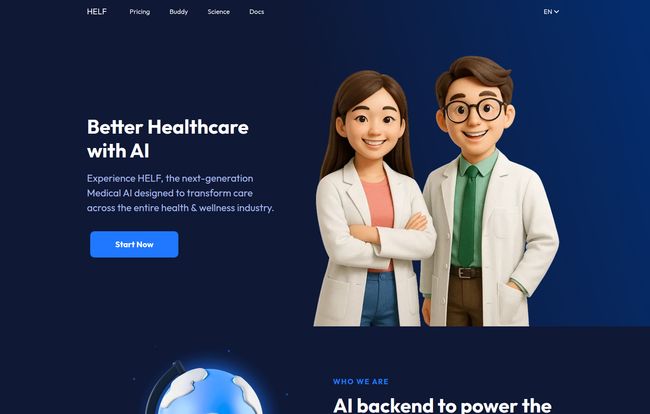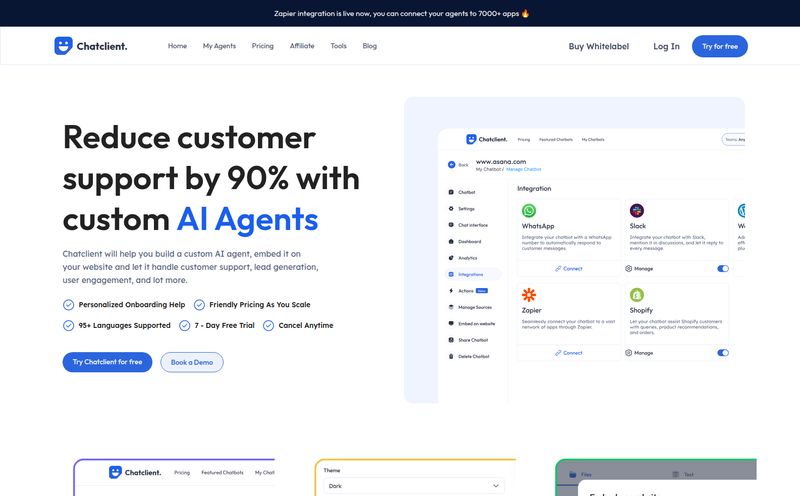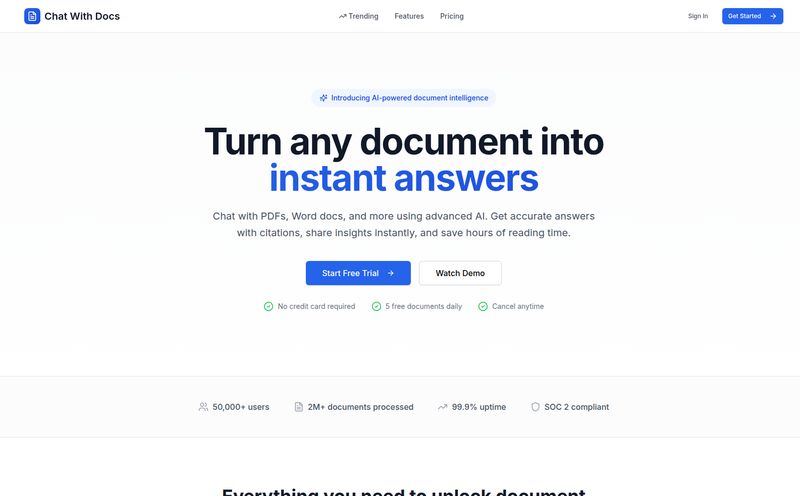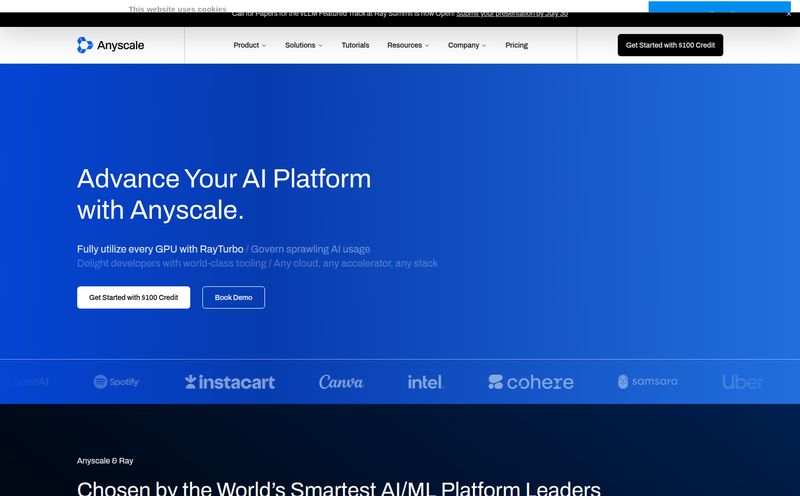As an SEO guy, I live and breathe data. I’m constantly wading through a firehose of algorithm updates, traffic analytics, and keyword trends. It can feel like trying to drink from, well, a firehose. It's overwhelming. But at the end of the day, if I miss a trend, the worst that happens is a client’s ranking dips a few spots. A pain, for sure, but not life or death.
Now, imagine that data stream wasn't about web traffic, but about human health. Imagine every new medical study, every rare disease symptom, every complex drug interaction being part of that stream. That's the daily reality for doctors and healthcare professionals. The sheer volume of information is staggering. And that’s where things get interesting, and where a tool like HELF enters the chat.
I’ve been watching the rise of AI in various sectors for years, and healthcare has always been the final frontier—a place where the stakes are incredibly high. So when I came across HELF, billing itself as a “Medical Superintelligence,” my curiosity was definitely piqued. Is this another piece of overhyped tech, or is it something genuinely useful? Let's get into it.
So, What Exactly is HELF?
Let’s cut through the marketing jargon. HELF isn’t a robot doctor that’s going to take your temperature and prescribe you medicine. It's an AI backend. Think of it less as the finished car and more as the powerful, intelligent engine inside it. Founded by a team of actual doctors and AI experts—which, I have to say, gives it immediate credibility in my book—it’s designed to be a supplementary brain for healthcare pros.
Its main gig is to provide instant access to the vast ocean of medical literature and deliver quick, relevant insights. The goal isn't to replace human expertise but to augment it. To make good doctors even better and more efficient. It’s like giving a world-class researcher an army of genius assistants who have read every medical journal ever published and can recall any piece of it in a split second.

Visit HELF
Before We Go Further: The Big, Bold Disclaimer
Okay, let's address the elephant in the room, because it's the most important part of this whole discussion. The creators of HELF are very, very clear about this, and I want to echo it loudly: HELF is for educational and informational purposes only.
This is not a medical device. It does not provide diagnoses. It does not suggest treatments for patients. You can't plug in your symptoms and have it tell you what's wrong. Using it for direct patient care is a huge no-no. I actually find this responsible approach refreshing. In a world where tech companies often promise the moon and ignore the risks, HELF seems to be building with a strong ethical framework from the ground up, putting privacy and patient safety at the core of its design.
Unpacking the Toolkit: What Can HELF Actually Do?
So if it’s not diagnosing patients, what is it doing? Its features, listed under the #AskHELF tag, give us a pretty good idea of its power. It’s more than just a smart search engine.
A Second Brain for Decision Support
Doctors often face complex cases with overlapping symptoms. HELF acts as a sounding board, helping with things like Condition Classification and navigating Complex Dilemmas. A doctor could, for example, use it to quickly review differential diagnoses for a rare set of symptoms, cross-referencing against the latest case studies. It’s about having a co-pilot that can pull up the schematics while you fly the plane.
Research That Doesn't Take All Day
One of the most exciting features for me is the Evidence Review with Web Agent. Anyone in a research-heavy field knows the pain of sifting through papers on PubMed or Google Scholar. It's a grind. This feature seems designed to automate that, synthesizing evidence and reviewing literature in a fraction of the time. (And lets be real, what busy clinician has the time to read every new study that comes out?)
Wellness, Lifestyle, and API Integration
HELF isn't just for complex clinical scenarios. It also covers Health Insights and Wellness & Lifestyle, making it potentially useful for dietitians, wellness coaches, and other health-adjacent professionals. But the part that gets my inner tech-nerd going is the mention of Ready to use APIs. This means organizations can integrate HELF's 'brain' into their own existing systems—be it a hospital's internal knowledge portal or a new health tech app. That's where it goes from a tool to a platform.
The AI That Never Stops Learning
Here’s the kicker. HELF is built on a deep learning AI. This isn’t a static database of information. It's a system that is designed to constantly improve. It learns. It evolves. The more it's used (within its ethical boundaries, of course), the more connections it can make. It’s like a medical resident who never sleeps, never gets tired, and spends 24/7 reading every new piece of research to become more knowledgeable. The potential there is, frankly, immense.
What's the Price Tag on Medical Superintelligence?
This is the question on everyone's mind, right? How much does it cost? Well, the website doesn't list a clear pricing structure. There's a big, friendly "Start Free Now" button, which suggests a trial, a freemium tier, or some kind of demo access. My guess, especially with the API and organizational focus, is that the full-fledged version is likely based on custom, enterprise-level pricing. This makes sense—a tool this specialized is probably sold as a solution for entire clinics, hospitals, or research institutions rather than a monthly subscription for individuals. Your best bet is to hit that 'Start Now' button and see for yourself.
My Take: The Good, The Caveats, and The Future
So, what’s my final verdict? I'm cautiously optimistic. I think tools like HELF represent the right way to bring AI into healthcare. Not as a replacement for human experts, but as an incredibly powerful assistant.
The upsides are obvious. Giving professionals the ability to access and synthesize medical knowledge instantly could genuinely improve outcomes and streamline care. Democratizing this level of knowledge is a huge deal, especially for practitioners in more remote or under-resourced areas. It levels the playing field.
The major caveat, and its a big one, is that its utility is entirely dependent on the user's understanding of its limitations. It's an experimental tool. It's an expert research assistant, not a doctor. As long as everyone involved respects that boundary, the potential for good is enormous. But if people start trying to use it as a shortcut for medical diagnosis... well, that's a dangerous road.
Ultimately, HELF feels like a significant step forward. It's a tool built for the reality of modern medicine: an ever-expanding universe of information that no single human brain can possibly contain.
Frequently Asked Questions about HELF
Can I use HELF to diagnose my illness?
Absolutely not. HELF is explicitly not a medical device and does not provide diagnoses or treatment plans. It is an educational tool for healthcare professionals. Always consult a qualified doctor for any medical decisions.
Is HELF a replacement for a doctor?
No. It's designed to be an augmentation tool—a co-pilot—for doctors, researchers, and other professionals to help them access and process information more efficiently. The human expert is still in the driver's seat.
How does HELF ensure privacy and ethics?
According to their site, ethics and privacy are at the core of their design. It was founded by doctors and AI professionals, suggesting a strong understanding of the importance of data security and responsible use in the medical field.
Who is the ideal user for HELF?
The ideal users are healthcare professionals, medical researchers, students, and healthcare organizations looking to empower their staff with advanced knowledge retrieval and decision support tools.
How is HELF better than just using Google?
While Google searches the public internet, a tool like HELF is designed to access and synthesize information from curated, authoritative medical literature. Its AI can understand context and relationships between data points, providing insights rather than just a list of links. It's the difference between a library and a genius librarian.
Is HELF free?
There appears to be a free trial or free tier available, indicated by the "Start Free Now" call to action. However, full pricing information isn't public, which often means custom or enterprise-level plans are available for organizations.
Reference and Sources
- Information and visuals for this review were sourced from the official HELF website, accessible at helf.ai.



